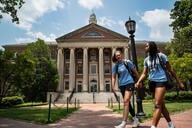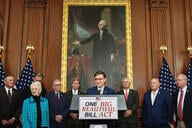You have /5 articles left.
Sign up for a free account or log in.
WASHINGTON -- When the U.S. Education Department announced in October that it would hold negotiations to recommend new rules on student loans, the topics on the table appeared to be the sorts of nitty-gritty, in-the-weeds matters that might produce heated discussions among hard-core financial aid administrators but put anyone else to sleep: "repeal of unnecessary regulations" because of the government's switch to 100 percent direct lending, "treatment of borrowers subject to administrative wage garnishment," "post-discharge monitoring of employment earnings."
And department officials generally told those who asked that the rule making would be "technical" in nature, and that as always the agency would seek negotiators who had both expertise on the topics in question and a stake in how they were resolved.
All of which resulted in a fair bit of surprise Thursday when the department released its list of those chosen to participate in the negotiations -- a list that gave 3 of the 14 primary slots on the committee to student/consumer groups and a fourth to the consumer protection chief for the state attorney general (from Kentucky) who is leading the national charge at the state level against potential financial aid abuse by for-profit colleges.
The negotiating team includes a majority of the sort of campus financial aid officials and experts on student lending who would seem a good match for the technically heavy agenda that appears to await the panel.
But the number of negotiators without much experience on nitty-gritty financial aid issues -- and with a history of activism on student aid issues -- left some college and financial aid lobbyists with an uneasy sense that the Obama administration might have an agenda other than the stated one for the panel. And while they declined to speculate what that agenda might be, several said they suspected it would be unlikely to be friendly to for-profit institutions.
It would not be the first time in recent years that presidential administrations (of different parties) had been accused of establishing negotiated rule making processes on contentious topics or of stacking the composition of negotiating teams with desired outcomes in mind. Both of those processes ended without members of the panels reaching agreement.
The department on Thursday conceded that the issues on the table for the negotiators will be "largely technical," but said that its officials want consumers protected even in those conversations. The panel will consider issues such as loan repayment levels based on borrowers' income, and what qualifies borrowers to be characterized as permanent disabled, the department said, noting that consumer advocates have a legitimate and important role in weighing those issues. (In a related matter, the department also published the list of negotiators for its other rule making committee, on teacher education issues.)
The members of the negotiating panel announced Thursday (and the categories they represent) are:
- Students: Getachew Kassa, legislative director, United States Student Association (alternate: Abou Amara Jr., president, U. of Minnesota Graduate and Professional Student Association)
- Legal assistance to students: Deanne Loonin, National Consumer Law Center (alternate: Radhika Singh Miller, program manager for educational debt relief and outreach, Equal Justice Works)
- Consumer advocacy organizations: Jennifer Mishory, deputy director, Young Invincibles (alternate: Maureen Thompson, the Hastings Group)
- Financial aid administrators: Margaret Rodriguez, senior associate director of financial aid, University of Michigan (alternate: Elizabeth Hicks, executive director of student financial aid, Massachusetts Institute of Technology)
- Business officers and bursars: David Glezerman, assistant vice president and university bursar, Temple University (alternate: Maria Livolsi, director, student loan service center, State University of New York)
- Institutional third-party servicers: Robert Perrin, president, Williams & Fudge
- State attorneys general: Todd Leatherman, executive director, office of consumer protection, Office of the Kentucky Attorney General (alternate: Michele Casey, assistant attorney general, consumer fraud bureau, Office of Illinois Attorney General)
- Two-year public colleges: Cristi Millard, director of financial aid, Salt Lake Community College (alternate: Chris Christensen, director of financial aid, Johnson County Community College)
- Four-year public colleges: Kris Wright, director of student finance, University of Minnesota (alternate: Elaine Papas-Varas, university director of student financial aid, University of Medicine and Dentistry of New Jersey)
- Private nonprofit institutions: Yvonne Gutierrez-Sandoval, senior associate director of financial aid, Pitzer College (alternate: Eric Weems, director of financial aid, Loyola University Chicago)
- Private for-profit institutions: Tom Sakos, director of student lending and regulatory quality assurance, DeVry Inc. (alternate: Anthony Fragomeni, director of governmental affairs, Empire Education Group)
- Guaranty agencies: Betsy Mayotte, director of regulatory compliance and privacy, American Student Assistance (alternate: Scott Giles, vice president for operations for social marketing and strategy, Vermont Student Assistance Corporation)
- Lenders and secondary markets: Robert Sandlin, director of policy and compliance, Higher Education Servicing Corp. (alternate: Vicki Shipley, senior advisor, National Council of Higher Education Loan Programs)
- Accrediting agencies: Albert Gray, executive director and CEO, Accrediting Council for Independent Colleges and Schools (alternate: Sharon Tanner, CEO, National League for Nursing Accrediting Commission).





